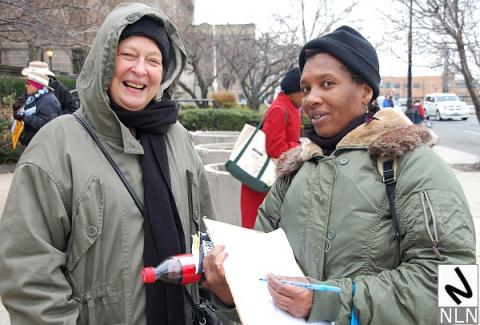Special to Portside
A day-long conference of academics, economists, labor and community activists discussed an Economic Bill of Rights for the 21st Century – a program of full employment with the right to a job and living wages.
Organized by the National Jobs for All Coalition, The Nation magazine, Dollars & Sense, the Greater NY Labor-Religion Coalition, the Left Labor Project and others, the conference was held at Columbia University in New York City. Panels of speakers from diverse fields, including economics, sociology, social welfare, history, labor and communications, drew on the legacy of Franklin D. Roosevelt’s 1944 call for a Second Bill of Rights with its guarantee of full employment, living wages, housing, medical care, education, and retirement security.
Rep. John Conyers (D-MI) keynoted the event drawing attention to H.R. 1000, the “Humphrey-Hawkins 21st Century Full Employment and Training Act.” The bill, reintroduced into Congress in March 2013, currently has 50 Congressional co-sponsors. It would establish a tax on large scale Wall Street securities transactions to fund the creation of 4 million jobs within the first two years of passage.
“Full employment must be at the top of our domestic agenda,” said Conyers. “FDR made the case for full employment with his Second Bill of Rights. He understood that full employment is the foundation of economic democracy. We aren’t going to wait for the private sector – government must do it,” he said.
Noting the efforts of the Black Caucus, the Hispanic Caucus, the Asian-Pacific Caucus and the Progressive Caucus of Congress in supporting HR 1000, Conyers said “in spite of Citizens United, we can win this.” He continued, “We aren’t doing badly with sponsors but there has to be a grass roots campaign to win it. It’s people like you who can make it happen.”
Part of the grass roots support has come from conference participants such as Ed Rosario, a member of the Executive Board of the NYC chapter of the Labor Council for Latin American Advancement, AFSCME Communications Director Chris Policano, and members of the Left Labor Project, an organization of labor activists in NYC that has been circulating petitions in support of H.R. 1000.
Another panelist, Derrick Hamilton, Associate Professor of Economics and Urban Policy at The New School, focused remarks on the racial disparity in unemployment. “Black people are in a perpetual state of joblessness.” Official Black unemployment is over 13% and white joblessness is 4.8%, said Hamilton. He calculated that a federally-sponsored full employment program with wages of $30,000 including benefits would cost $750 billion. It is a sum well worth the price if it ends joblessness and brings dignity to human life, said Hamilton.
Economist Dean Baker called for shorter work hours to create more jobs. Germany has reduced the work week and this is, in part, responsible for the country’s much lower 5% unemployment rate.
Michael Lighty, Director of Public Policy for the California Nurses Association/National Nurses United discussed the “Robin Hood Tax,” a bill to establish a financial transactions tax to fund social needs (H.R. 6411, “Inclusive Prosperity Act). Lighty talked about the leading role of the nurses union in championing H.R. 6411 and said the bill is modeled after FDR’s Economic Bill of Rights.
Katrina vanden Heuvel, editor and publisher of The Nation magazine, talked about the need to “retrieve our history” in promoting FDR’s program for full employment. “FDR would be run out of Washington as a radical in today’s Congress,” she said.
David Woolner, Senior Fellow and historian at The Roosevelt Institute, said there is a large network of hundreds of young people on campuses around the country drawn to the study and legacy of FDR through his Institute. He invited participants to connect with it.
Following the conference, a meeting of representatives of sponsoring organizations met with leaders of the National Jobs for All Coalition to discuss a stepped-up plan of action to build a grass roots campaign in support of H.R. 1000 including more Congressional sponsorship.
For more information: www.njfac.org njfac@njfac.org 203-856-3877
____
Pat Fry is a co-chair of the Committees of Correspondence for
Democracy an Socialism (CCDS)


Spread the word